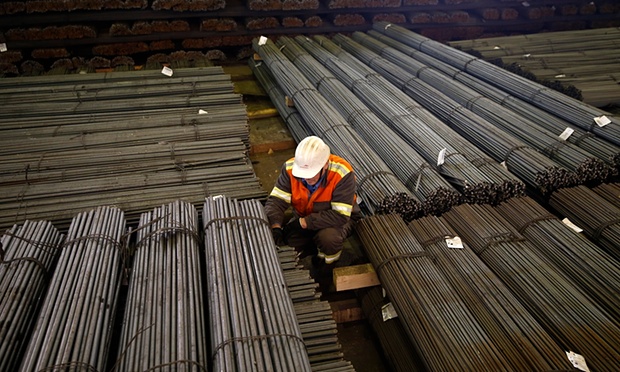Steel industry at tipping point, Bill Shorten warns Malcolm Turnbull

Opposition leader says workers need protection, and blames Coalition’s ‘rightwing economic textbook’ policy for troubles at South Australian plant
Labor is turning the screws on the Coalition over the future of steel workers in the South Australian town of Whyalla, saying the industry is under attack because of “rightwing economic textbook” ideology on trade.
Bill Shorten has called on the government to protect workers, after the steel and mining group Arrium announced earlier in the week that its Whyalla steelworks needed to find $60m in savings or face closure.
The opposition leader wrote to the prime minister, Malcolm Turnbull, demanding that the government strengthen anti-dumping laws, prioritise the purchase of Australian steel in procurement and infrastructure projects, and invest in a port in Whyalla.
“The steel industry in Australia, in particular Whyalla, is at a tipping point,” Shorten told reporters on Friday. “I have been appalled at the neglect, the dereliction of duty by the current Liberal government when it comes to manufacturing jobs.
“Right now the steel industry’s under attack. What we see is Chinese and Korean steel companies effectively engaging in the trade version of match-fixing and we need the rules to back up our jobs and our people.
“It’s time that Australia got its head out of the sand and stopped pretending there’s a level playing field out there because there’s not and the only people that get damaged by this level playing field philosophy of the Liberals are blue-collar workers and their families,” Shorten said.
“We would be mugs if we waved goodbye to the steel industry just because we’d swallowed some rightwing economic textbook which said we should only do certain things in this country.”
The industry minister, Christopher Pyne, did not rule out providing Arrium with financial assistance.
“I believe we are a long way from resolving that particular issue,” he told reporters on Friday. “The federal government and the [South Australian] state government are talking about that.
“If there is to be any kind of financial advice for Arrium, it would take some time to discuss that with the South Australian government and with Arrium, and any kind of support like that would need to be a long-term structural reform,” said Pyne, who represents the South Australian electorate of Sturt. “We’re not in the business of giving taxpayer money to businesses that are struggling.”
Pyne indicated co-investment with the SA government and Arrium was part of the discussions the Commonwealth was having with its state counterpart.
The minister announced on Thursday that the federal government had asked the anti-dumping commission to investigate if steel was being dumped in Australia.
“Free trade is a basic philosophy of our government, as it was of the Labor government, but free trade doesn’t mean it has to be unfair trade,” Pyne told reporters on Thursday.
Shorten said Labor had been calling for an investigation into anti-dumping measures for months.
“I urge you to accelerate this review, which is something Labor called for in October,” Shorten wrote in his letter to the prime minister. “Furthermore, I ask that you expand the minister’s reference to the anti-dumping commission beyond merely an assessment of the possible harm to local industry and prioritise the development of options for action under World Trade Organisation provisions.
“Had your government acted on this issue four months ago when Labor first raised these issues, your government would now be proposing action rather than further reviews.”
Pyne said the issue of procurement was “on his agenda”, but he shifted the responsibility of using Australian-standard steel in infrastructure projects on to the states.
“The facts are that the Commonwealth government doesn’t do a lot of construction. Construction, road-building, new buildings – things like the Adelaide Oval for example – are done by the state and territory governments,” he told reporters on Friday. “So really, it’s their policies that matter.”
South Australia has changed legislation to ensure it uses only certified Australian steel, a move welcomed by Pyne.
“If every state and territory government made that same announcement, I think that would be a very positive message to send,” he said.
He ruled out using legislation to ensure the states and territories complied.
“I don’t believe the states should be infantilised in how they make their own decisions. I would hope that it’s clear that they can make a difference to the Australian steel industry, that they would follow South Australia’s lead on this issue.”
The Coalition’s standing in the polls in South Australia has tanked over the past two years, after it refused to continue subsidising the car manufacturing industry and backed away from an election promise to build its next generation of submarines in the state.
It has since enacted a “competitive evaluation process”.
Pyne said Australia should be using local steel for all ship and submarine building, but even that would not solve Whyalla’s immediate and pressing issues, he added.